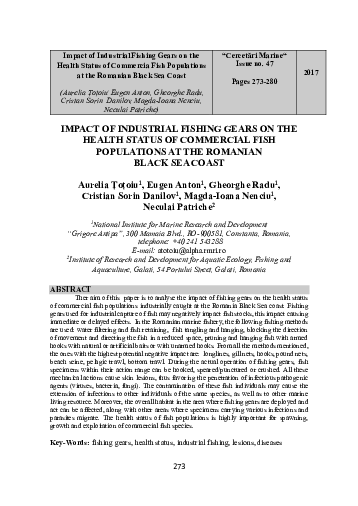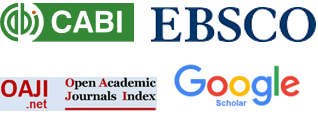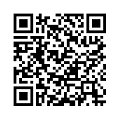Impact of Industrial Fishing Gears on the Health Status of Commercia Fish Populations at the Romanian Black Sea Coast
DOI:
https://doi.org/10.55268/CM.2017.47.273Keywords:
fishing gears, health status, industrial fishing, lesions, diseasesAbstract
Ther aim of this paper is to analyse the impact of fishing gears on the health status of commercial fish populations industrially caught at the Romania Black Sea coast. Fishing gears used for industrial capture of fish may negatively impact fish stocks, this impact causing immediate or delayed effects. In the Romanian marine fishery, the following fishing methods are used: water filtering and fish retaining, fish tangling and hanging, blocking the direction of movement and directing the fish in a reduced space, pruning and hanging fish with armed hooks with natural or artificial baits or with unarmed hooks. From all the methods mentioned, the ones with the highest potential negative impact are: longlines, gill nets, hooks, pound nets, beach seine, pelagic trawl, bottom trawl. During the actual operation of fishing gears, fish specimens within their action range can be hooked, speared/punctured or crushed. All these mechanical actions cause skin lesions, thus favoring the penetration of infectious pathogenic agents (viruses, bacteria, fungi). The contamination of these fish individuals may cause the extension of infections to other individuals of the same species, as well as to other marine living resource. Moreover, the overall habitat in the area where fishing gears are deployed and act can be affected, along with other areas where specimens carrying various infections and parasites migrate. The health status of fish populations is highly important for spawning, growth and exploitation of commercial fish species.
Downloads
Published
2017-12-02
How to Cite
Țoțoiu, A., Anton, E., Radu, G., Danilov, C.-S., Nenciu, M.-I., & Patriche, N. (2017). Impact of Industrial Fishing Gears on the
Health Status of Commercia Fish Populations
at the Romanian Black Sea Coast . Cercetări Marine - Recherches Marines, 47(1), 273–280. https://doi.org/10.55268/CM.2017.47.273
Issue
Section
ORIGINAL ARTICLES
License
This is an open access journal, which means that all content is freely available without charge to the user or his/her institution. Users are allowed to read, download, copy, distribute, print, search, or link to the full texts of the articles, or use them for any other lawful purpose, without asking prior permission from the publisher or the author. This is in accordance with the BOAI definition of open access.






